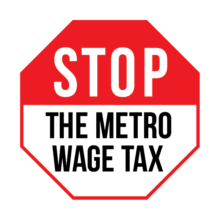Why This Portland Transit Veteran Is Voting No on Metro’s Bond
By GB Arrington
When I stepped down as TriMet’s Director of Strategic and Long Range Planning, the TriMet Board gave me a fancy brass clock engraved with “You may not like the message, but you know it’s true.” So, here is the unvarnished truth, a vote for Metro’s $5 billion Transportation Bond Measure will hurt the region’s livability. It’s a bad idea, and that is why I’m voting no.
The measure Metro referred to the voters is an example of broken old-time transportation politics. You will be voting on a Christmas tree loaded down with sprawl inducing road projects and a new MAX light rail line to Washington County that simply does not stand up to rigorous analysis. Metro paved the measure’s way to the ballot by giving every part of the region an earmark for a pet project. New suburban highway capacity in Clackamas County. Bridge replacement in Multnomah County. Quicker access to Port of Portland airport parking garages.
For two plus decades my job at TriMet was to help set the future direction and weigh in on the decisions required to help assure the success of TriMet and the region. I was part of the team planning the region’s first MAX lines. I sat at the table shaping Metro’s Region 2040 land use and transportation plan. And I lead the planning to create livable mixed-use communities around the east and westside MAX lines. Collectively, we worked to ensure the livability of the region’s residents and getting more riders for TriMet.
The opening of the Portland Transit Mall in 1978, when I was a young planner, was the region’s first installment in a signature strategy that would repeat itself over and over — using transit investments to help achieve broader community building objectives. In that case to help revitalize a declining downtown. After decades of hard work, the Portland region rightly won global acclaim for how it pioneered linking new transit investments with land use to leverage its vision to “grow up, not out.”
Sadly, Metro has now chosen conventional political pork barrel over being the steward of the region’s livability. Metro’s proposed transportation measure departs from its past track record of success and innovation. The most expensive project in the package, the $2.8 billion SW Corridor light rail project, is a perfect case in point on what’s wrong. Don’t be fooled by the hyperbole, the SW Corridor has always been a very expensive politically driven project with marginal transit and land use benefits.
